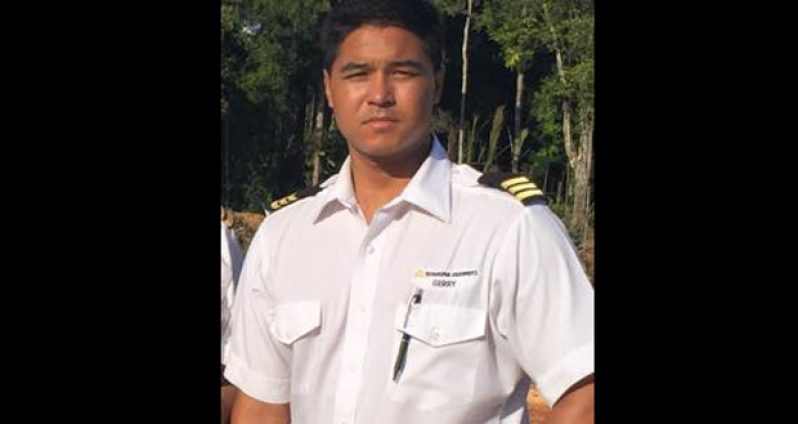By Shauna Jemmott
A YOUNG pilot has credited his military training for holding his ground during a testing experience when he was the first to spot the body of the woman who recently plunged to death at the world-famous Kaieteur Falls, utilising his binoculars as he hung off a nearby cliff.Captain Gerry Gouveia Jnr said he had never before experienced such trauma and believes that a woman in the worst state of distress could have been met somewhere else along the path of depression if officials had found it vital to reach out.
On November 21, Roshinee Pagwah, 21, of Reliance Abandon, East Canje, Berbice, plunged to her death over the 741-foot Kaieteur Falls around 11:00 hrs, and was later confirmed dead by personnel of the Ministry of Tourism.
The media reported that she had stopped and took a long, thoughtful look at the Kaieteur Falls just moments before running for the fatal jump.
The Guyana Chronicle reported the following day: “According to Tremayne Junor, Roraima Airways Marketing and Public Relations (PR) Assistant, who was present at the scene, the young lady appeared to be very reserved during the trip to the world’s largest single-drop waterfalls.”
The story further stated that Pagwah had travelled alone and had appeared “withdrawn from the group” of 11 persons, which included two tour guides, a Kaieteur ranger and a staff member of Roraima Airways, Junor.
The passengers were taken on a Roraima Airways flight, piloted by the young Gouveia, for a day view of the Kaieteur known for being the world’s longest one-drop falls, pouring 741 feet into its gorge. “It was definitely shocking,” Gouveia told the Chronicle.
He stopped during his busy schedule preparing for the final send-off of their company’s Chief Pilot Alvin Clarke, who died of cancer earlier that same morning in his brother’s bed in Canada, while visiting there for medical evaluation.
He said hearing that a passenger had plunged over the waterfall was one of the worst things he has ever heard since he had become a pilot.
“When the girl [staff] was running up to me, I figured maybe she was bringing me some food. When she told me [what had happened] I was in shock,” he recounted.
“She had to say it two or three times and when it registered, I just started making my way down to the falls because I knew if there was nothing I could do for her, I needed to help my other passengers who were down there. So I was lucky enough to be down there within minutes of the event and the passengers had just made it up to the guest house.”
“I’m not sure if it was the military training, [but] a different part of me took over. Emotions weren’t a part of it. It was very mission-oriented. So I made sure everyone was ok and I checked on them and assigned one of the tour guides to take them back up,” he said.
He said he then took the only man who saw the entire episode and they retraced the steps. “And that’s when I started my look for her.”
Gouveia Jnr, along with a small number of tour guides and colleague Captain Emil Jahan were at the side of Kaieteur with binoculars searching for the body, and “then I finally found the body, identified that it was her and then I had the tour guides track her location.”
However, he said the experience was not “very emotional” but was “definitely a very mission-oriented experience.”
At 28 years old, he had already spent close to eight years in the Canadian military, both in Infantry and Airforce bases, and has a tendency to switch personalities in an emergency situation with the soldier being foremost. He flew in Canada for five years before returning home and has been a pilot employed with Roraima, flying into the jungle of Guyana about a year now.
“That kind of training, it sticks with you. When these kinds of emergency events happen a switch goes off and you start thinking objective-oriented and mission-oriented.”
He believes Pagwah’s life could have been saved if Guyana’s mental health systems had prevented it.
“It is just unfortunate that our mental health systems in Guyana could not have prevented this. There’s only so much you can do on the receiving end at the falls itself, but if someone is determined you have to get to them long before they actually make the decision,” he said, adding that, “We could have gotten to her sooner.”
Young pilot recalls trauma of spotting Kaieteur jumper
SHARE THIS ARTICLE :
Facebook
Twitter
WhatsApp




.png)









